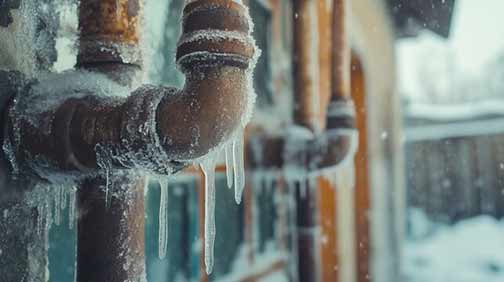
A frozen water pipe in your home is often the equivalent of living in a house without a water supply. What you do immediately after discovering this problem can make the difference between spending a day and night without water versus spending a few hours without water says TrustArt Realty Management team.
Your actions after finding the problem also determine if you have a broken pipe and water damage to deal with afterward or not. What should you do if your home’s plumbing is frozen? How can you minimize the physical, emotional, and financial impact of the problem?
What to do if your water pipe is frozen
- Turn off the water supply
Water expands when it freezes, and if you leave the water on, ice may build up inside the pipe, causing it to split. That will not be apparent until the pipe thaws and starts to leak. Hopefully, your pipe has not cracked already.
To turn off the water, look for the main water shut-off valve. This can be found in your utility room, basement, or outside your house, where the water line enters the home. If you can’t locate this valve, the damage to your plumbing (or home) may be worse.
- Call your plumber
Ideally, the next step should be to contact an emergency plumber and have them come over. Depending on the day and time, a regular plumber may not be able to come over. If you are unable to get hold of a plumber, proceed to the next step.
- Locate the frozen pipe
First look in the coldest areas of your home where the water is routed through. Typically, you can expect a frozen pipe to happen in these locations: water pipes that touch an outside wall and pipes in the unheated spaces in your home (such as inside a cabinet or pipes in the bathroom, garage, or crawlspace).
- Thaw the pipe
You can do this with a hair dryer, heat gun, heat lamp, propane torch, or other heat source. Whatever heat source you are using, keep it a safe distance from the pipe while moving it back and forth in wide sweeping motions. To avoid damage, do not point the heat directly at the pipe.
If you are using a hair dryer or other device connected to electricity, ensure you do not allow it to come into contact with water. When thawing your pipe, keep a bucket of water and lots of towels close by in case the pipe has already burst. Also, keep a nearby faucet open.
Your goal here is to get a slight flow going in the pipes. Once you see water trickling from the open faucet, you can stop. As long as there is a trickle of water flowing through the pipe, the problem will sort itself out. If the pipe leaks, you may need to stop until you can get a plumber to look at it.
- Turn on the water
Finally, turn on the water slowly at the main shut-off valve. Inspect all your pipes to make sure you don’t have a leak. This helps to ensure you don’t flood your home. If you don’t find a leak in your plumbing, open the valve.
How to keep your pipes from freezing
The best time to deal with a frozen pipe is before it happens. The simple reason water pipes in your home freeze is that they are exposed to cold air. If you have a way to prevent this, you can stop your pipes from freezing. Here are some of the most effective ways to do this.
- Insulate exposed pipes
You can wrap the pipes with insulation or slide foam tubes over them. If this is not possible, you can keep the pipe warm by wrapping it with heat tape. When using heat tape, be aware that cheaper options don’t last, and there is a risk of fire if the tape is not installed properly.
- Install a vent
You can install a vent in your cabinet to let warm air enter the space. This solution works well with heat tape because if you have tape in place but forget to turn it on, your pipes could freeze. However, if you have a passive vent in the area, it will allow for better air circulation.
- Install PEX pipes
Copper and hard plastic pipes are more likely to split if the water freezes. PEX pipes on the other hand can expand. Installing PEX pipes in your home will not stop the pipes from freezing. However, it ensures that the pipes do not split when they freeze.
Lastly, talk to your plumber for tips on winter proofing your plumbing to prevent frozen and burst pipes. You want to have an emergency plumber on hand for those times when you have a plumbing problem in your home that needs to be fixed urgently.


